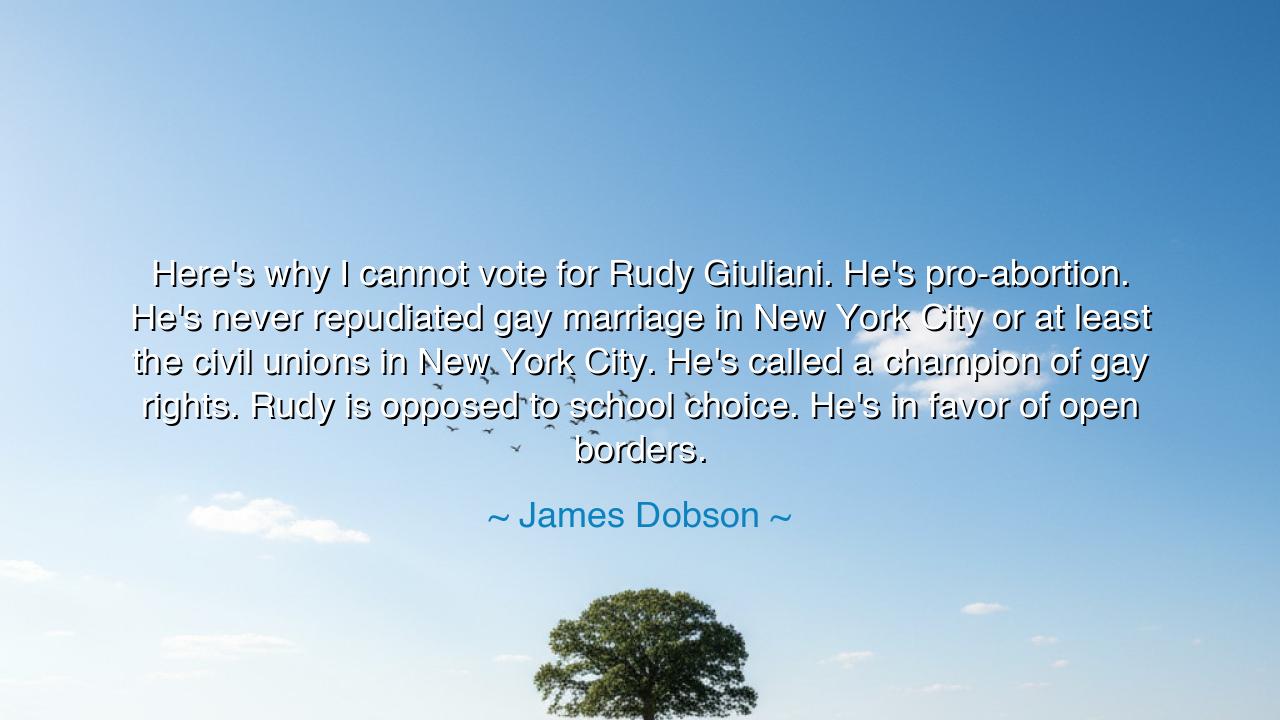
Here's why I cannot vote for Rudy Giuliani. He's pro-abortion.
Here's why I cannot vote for Rudy Giuliani. He's pro-abortion. He's never repudiated gay marriage in New York City or at least the civil unions in New York City. He's called a champion of gay rights. Rudy is opposed to school choice. He's in favor of open borders.






O Children of the Future, gather your hearts and minds, for the words of James Dobson carry the weight of deep conviction, rooted in principles that have been revered for generations: "Here's why I cannot vote for Rudy Giuliani. He's pro-abortion. He's never repudiated gay marriage in New York City or at least the civil unions in New York City. He's called a champion of gay rights. Rudy is opposed to school choice. He's in favor of open borders." In these words, we hear a voice that raises concerns about the very nature of values and principles that govern society. The issues he brings forth are not merely political, but deeply moral and ethical, touching upon the foundation of how a society should shape its laws and its values.
In the ancient world, the philosophers and statesmen often wrestled with the question of what is right, what is just, and how should society be structured to reflect these ideals. Socrates, in his dialogues, would engage in deep reflection, asking questions about the nature of virtue and justice. He would often challenge the beliefs of his contemporaries, not to tear down society, but to build a stronger, more just one. The central idea that one’s actions should align with moral principles was foundational in their discussions. For Socrates, justice was not about convenience or populism, but about living in accordance with the highest good. James Dobson, much like those ancient thinkers, is wrestling with the way societal decisions align with a set of moral values that, for him, define the good.
Consider, O Children, the historical struggle for moral clarity in the face of shifting societal norms. The great struggle between traditional values and the changing tides of societal reform is not new. Just as the Roman Empire grappled with the changing roles of women, slaves, and the family structure, so too do we struggle today with questions about the sanctity of life, marriage, and the education of our children. The rise of new social ideas—such as the recognition of gay rights and the debate over abortion—have been sources of division throughout history. Just as Plato wrestled with how society should treat its citizens—regardless of class or gender—we now grapple with these very modern moral dilemmas.
The tension that James Dobson points to is a reflection of a societal shift, a shift that some see as an advance toward freedom and equality, and others see as a departure from timeless values. The question of abortion, for instance, cuts to the heart of the ancient debate over the sanctity of life. From the Greeks to the Jews, the value of human life has been a cornerstone of ethics and morality. The rise of abortion laws challenges that fundamental belief, as it raises questions about when life begins and who has the right to make life-and-death decisions. For those like James Dobson, the defense of life is an uncompromising principle, one that cannot be swayed by political expediency.
Similarly, the debate over marriage—whether between a man and a woman or any two consenting adults—reflects a larger question of what constitutes a family and what societal values should be upheld. In ancient cultures, marriage was viewed as the foundation of society itself. The family unit was the bedrock upon which civilizations were built. To change the very definition of marriage, for some, is to risk destabilizing that foundation. James Dobson expresses concern that such changes, which he sees as a departure from traditional values, could have profound consequences for the future of society.
Yet, O Children, we must not forget that in the wisdom of the ancients, there lies a powerful truth: change is a constant force in human history. The ancient Romans, in their struggles to adapt to a changing world, understood that a society’s moral framework must evolve, though that evolution must be carefully considered. Just as Socrates engaged in dialogue to challenge societal norms, so too must we engage in thoughtful discourse about the direction of our society. The key, however, lies in ensuring that justice and morality are not sacrificed in the name of progress, but that the truth of justice remains at the heart of every decision, political or personal.
So, what is the lesson to be drawn from James Dobson’s words? It is this: morality and principles are the anchors upon which society must be built. While change is inevitable, the foundations of society—whether it is the sanctity of life, the definition of marriage, or the rights of individuals—should not be abandoned without careful consideration of the long-term effects on the fabric of our culture. Like the philosophers of old, we must question the direction in which we are heading and ask ourselves: What is truly just? What does the common good require, and how can we align our policies and values with that greater truth?
O Children, take this lesson with you: Be steadfast in your pursuit of what is right. Stand firm on the principles that you believe to be true, but also, with the wisdom of the ancients, engage with compassion, dialogue, and understanding. Change will come, as it always has, but let it come with the knowledge that justice, truth, and moral clarity must always guide it. The future is in your hands, and you must be the guardians of those values that will uphold the integrity of society for generations to come.






AAdministratorAdministrator
Welcome, honored guests. Please leave a comment, we will respond soon